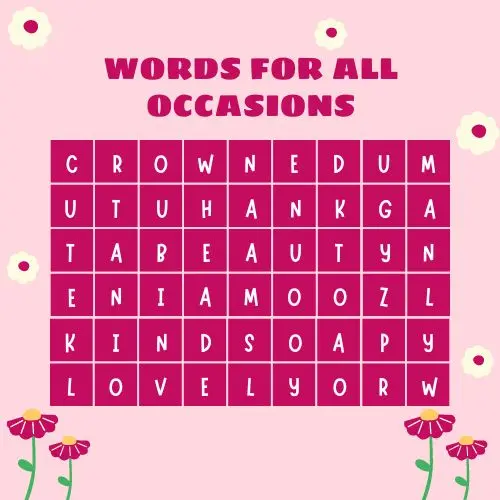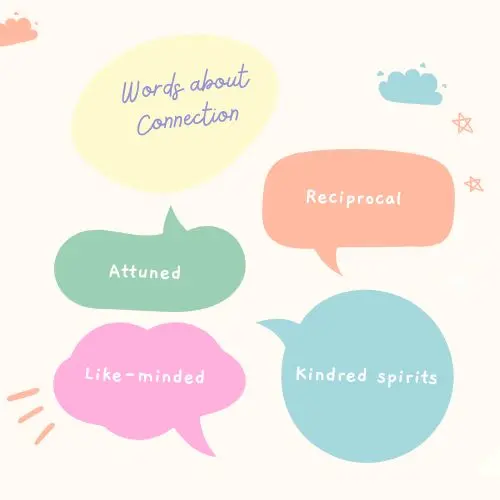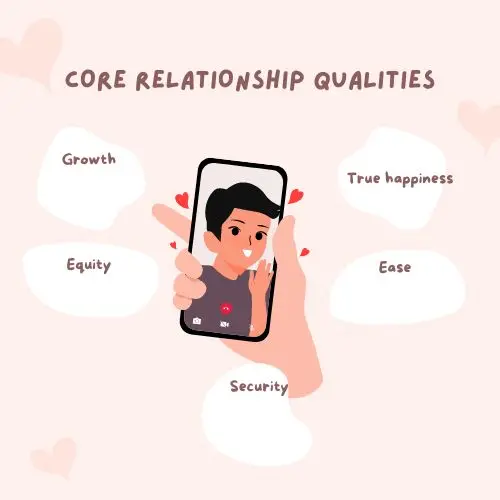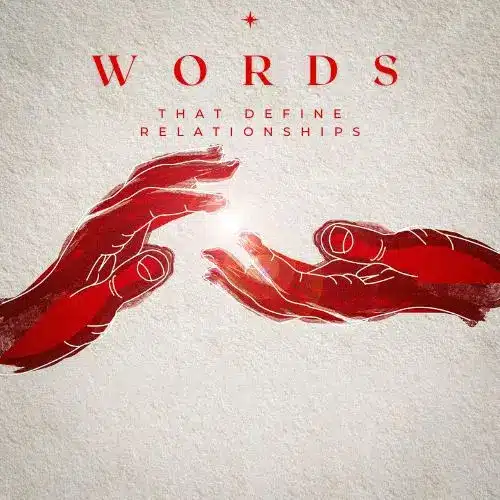Describing Relationships in Depth: Words for All Occasions

Relationships come in endless forms, whether with friends, family members, co-workers, partners, or anyone else we connect with. The words we use to characterize these connections carry power. They impact how we perceive relationships, communicate about them, and make decisions regarding their future.
Selecting fitting terms to depict a relationship requires thoughtfulness and discernment. Multiple words may seem applicable at first glance. However, subtle differences in meaning and connotation exist between synonyms. Additionally, descriptors carry positive, negative, or neutral undertones.
We can accurately describe relationship dynamics, changes over time, and our personal feelings with care. Doing so helps us understand relationships more clearly, enabling better choices that honor ourselves and others. Read on for an in-depth look at words to describe relationships on both good days and bad.
| Type | Positive Words | Negative Words |
|---|---|---|
| General | fulfilling, meaningful, deep | toxic, damaged, troubled |
| Connection | bonded, attuned, aligned | disconnected, distant, detached |
| Communication | understanding, open, transparent | closed-off, misleading, dishonest |
| Respect | equal, caring, empathetic | belittling, insensitive, judgmental |
| Intimacy | passionate, warm, affectionate | cold, numb, estranged |
| Growth | nourishing, uplifting, insightful | stagnant, limiting, stunted |
Positive Words for Healthy Relationship Dynamics
Many terms positively characterize pleasant, functional relationship dynamics. The best match depends on the connection’s closeness, communication style, longevity, and other factors. Here are major categories with examples to describe relationships positively.
Words about Connection

Connection represents a relationship’s depth of understanding, care, and emotional bond. Terms like these describe strong ties:
- Attuned – Both people sense and respond to each other’s needs and emotions.
- Reciprocal – Caring, understanding, and effort are returned mutually over time.
- In-sync – The pair shares routines, habits, pace of life, or thought patterns.
- Like-minded – Fundamental outlooks, priorities, and judgment align between the two.
- Kindred spirits – As if destined to meet, an uncanny similarity and comfort level exists.
Words about Communication
Open communication makes or breaks relationships. Positive terms like these indicate good communication:
- Expressive – Both parties share feelings, ideas, and concerns freely.
- Transparent – Honesty regarding emotions, histories, intentions, and more exists.
- Understanding – Individuals listen, absorb perspectives, and show care for the other’s inner world.
- Accessible – Making time for each other and checking in comes easily.
- Enlightening – Conversations bring new realizations that broaden worldviews.
Words about Respect
Respect encompasses honor, care, equality, and healthy boundaries. Upstanding relationship terms include:
- Considerate – Thoughtfulness about the other’s needs and preferences shows.
- Approving – Affirmation and praise come readily from one to the other.
- Empowering – Support for growth, autonomy, and fulfillment shines through.
- Protective** – Individuals demonstrate loyalty, discretion, and stabilizing care.
- Edifying – Interactions elevate morale, provide perspective, and inspire change.
Words about Intimacy
Emotional intimacy and physical closeness have distinctions worth articulating. These help characterize intimacy levels:
- Loving – Genuine love, adoration, and acts of care come through.
- Affectionate – Shared comfort with frequent physical expressions of fondness.
- Passionate – Powerful sensuality and romantic chemistry occur.
- Nurturing – Deep warmth and safety help the pair feel at home together.
- Playful – Spontaneity and joy flow plentifully.
Words about Relationship Growth
Ideally, relationships transform us positively over time through bonding lessons. Uplifting terms such as these fit:
- Enriching – Fresh blessings, resources, value, or beauty bless both individuals’ lives,
- Fruitful – Satisfaction abounds, with plenty of positive results from time invested together.
- Illuminating – Insights surface frequently, shedding light on new perspectives.
- Grounding – A stabilizing, anchoring effect helps both face challenges with resilience.
- Soul-feeding – Energy, inspiration, and vitality seem to flow between one another magically.
This broad list of affirmative words covers major areas, but endless variations exist. Choose terms that align closely with a specific relationship’s health and gifts.
Negative Words for Unhealthy Relationship Dynamics

Just as positive language clarifies strong connections, negative vocabulary pinpoints dysfunctional aspects. Consider which unflattering terms best match quandaries or dangers actively showing up. Precision helps assess and communicate wisely for improvement.
Words about Disconnection
Lack of closeness and drifting apart plague strained bonds, as these words capture:
- Detached – Previously, tight-knit individuals lost touch, careless, or rarely interact now.
- Aloof – One or both keep their distance purposefully, remaining removed or indifferent to the other.
- Out-of-sync – Rhythms, once aligned, no longer match due to incongruent lifestyles or priorities.
- Disengaged – Interest and initiative to connect meaningfully fade, turning interactions shallow.
- Inactive – Formerly vibrant closeness looks lifeless; little interaction or expressiveness exists.
Words about Poor Communication
When communication suffers, misunderstanding and assumptions fill the gaps. Consider these less-than-ideal descriptors:
- Guarded – Rather than open up, an individual conceals thoughts, feelings, or facts from the other.
- Dishonest – Deceit, secrecy, or lying erodes trust.
- Closed-minded – Rigid views leave no room for learning or empathy about contrasting perspectives.
- Unresponsive – Attempts to discuss issues or emotionally connect are met with silence, denial, or topic changes.
- Insensitive – Without care or tact, rude comments land insensitively.
Words about Disrespect
Imbalances around respect manifest through inequity, invasion, or degradation:
- Demanding – One person makes excessive rules or requests focused selfishly on their preferences.
- Clingy – Needy, smothering dependency overtakes healthy interdependence.
- Patronizing – Subtle contempt comes across via undermining words or tone.
- Exploitive – Someone leverages vulnerability for personal gain rather than mutual care.
- Sabotaging – Jealous behaviors deliberately obstruct blessings meant for the other.
Words about Toxic Intimacy
Dangerous intimacy patterns jeopardize well-being. Painfully rough descriptors include:
- Volatile – High drama, intensity, and unpredictable mood swings keep partners walking on eggshells.
- Turbulent – Frequent rollercoaster ups and downs prevent stable loving connection.
- Abusive – Dehumanizing, controlling, and demoralizing attitudes become evident through manipulative or violent behaviors.
- Empty – Despite the physical closeness, no actual emotional intimacy or relational substance exists.
- Traumatic – Toxic incidents inflict severe psychological or physical damage that lingers.
Words about Stunted Growth
When relationships no longer help people expand in positive directions, stagnation calls for examination:
- Drained – Previously uplifting time together now feels energetically draining overall.
- Outgrown – The pair finds meaningful connection around outgrown interests, priorities or lifestyles no longer shared.
- Smothered – Excessive possessiveness, coddling or need for attention inhibits personal growth.
- Enabling – Continued support masks or excuses harmful behaviors rather than inspiring change.
- Contaminated – Negative attitudes, toxic patterns or drama corrupt the relationship’s former health.
By identifying exactly which unwelcome traits show up currently, individuals gain clarity that is essential for wise next steps.
Relationship Buzwords: Trendy Terms
Beyond classic vocabulary, modern slang, and trendy expressions also capture relationship contexts. These popular phrases appear frequently in media and everyday talk:
- The one – Referring to a lover as someone’s destined life partner or soulmate.
- Love bombing – Showering a partner with extreme flattery, gifts, and promises early on.
- Ghosting – Suddenly disappearing without explanation after dating someone.
- Breadcrumbing – Leaving flirtatious social media crumbs to lure potential partners without commitment.
- Cushioning – Dating back-up options casually while pursuing another relationship seriously.
- Orbiting – Monitoring an ex’s social media closely after separating instead of a clean break.
- Simping – Going overboard trying to impress someone, especially through excessive compliments.
- Wokefishing – Pretending shared progressive views, mainly on apps, before revealing contrasting beliefs later.
Beyond fads, these modern terms contain useful pointers about forming connections authentically. Savvy daters look beyond the hype at actual relationship foundations: reliable intimacy, equality, and growth space for both.
Society’s ever-expanding vocabulary for unique dating behaviors also highlights timeless romantic wisdom. Treating partners ethically as a whole, multifaceted humans ready for real connection remains countercultural. Truly “woke” lovers empower each other with care, respect, and compassion through life’s many chapters – no games, tricks, or shallow motives required.
Evolutions Over Time: Relationship Phases
Relationships transform drastically across phases. The initial ignition of chemistry and new discovery eventually leads to deeper layers of trust, interdependence, and commitment – or relationships fade out.
Durable bonds often share experiences like these classic stages:
Initial infatuation – Brain chemicals amp euphoria during early encounters; attraction feels intoxicating.
The formal phase – As the bond solidifies, effort towards impressing each other tapers into relaxed mutual caring.
Comfortable familiarity – With nothing left to prove, joy comes from fully being themselves together.
The power struggle – Beneath the honeymoon period’s harmony, unresolved differences surface; power dynamics undergo negotiation.
Co-creation – After weathering conflicts, a vibrant, co-created life emerges better.
The fork in the road – Do we move forward toward deeper commitment like marriage, kids or shared assets – or acknowledge irreconcilable differences?
Relationship maintenance – Long-term partnerships become most fruitful through continual nurturance.
Of course, each relationship has unique nuances, but core patterns tend to unfold in phases. Understanding this rhythm helps partners articulate transitions over time rather than reacting defensively.
With an empowering lens, relationships need not end after romance fades or conflicts erupt. In fact, working through imperfection often strengthens bonds, with positive communication as the key.
Going Deeper: Core Relationship Qualities

Beyond all descriptive traits, at the essence, our connections come down to a few key measurables. These yardsticks motivate us to invest through life’s ups and downs:
Growth – Does this relationship help me become my best self?
True happiness – Do I feel more joy, peace, and fulfillment consistently here than unease?
Equity – Do give and take balance reasonably for both individuals’ well-being?
Ease – How much struggle or sacrifice exists compared to effortless belonging?
Security – Does this bond steady or destabilize me through life’s uncertainties?
Prioritizing these vital signs above all other exciting or disappointing factors leads relationships toward long-term thriving.
Conclusion: The Power of Words
The words we harness to articulate relationship realities hold profound influence. They impact how we perceive and participate in connections shared with the world around us. With thoughtful descriptors, we distill truths necessary to make constructive choices. Across changing life seasons, through trial and error, our capacities expand to define nuances of dysfunction or health with ever-increasing wisdom. May our growing vocabulary around relationships continue illuminating the way toward greater understanding and human progress worldwide.

